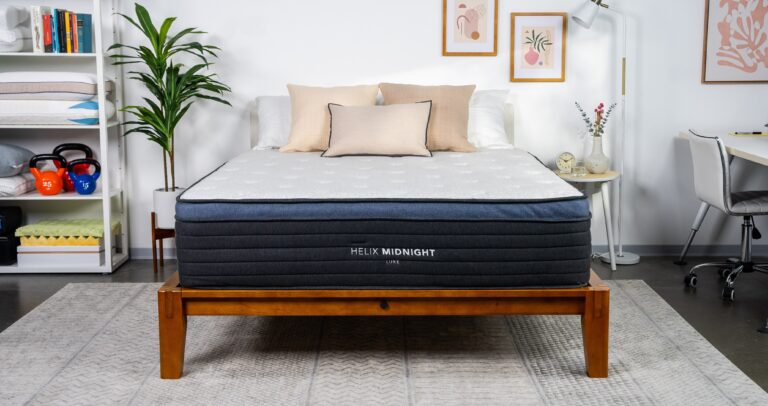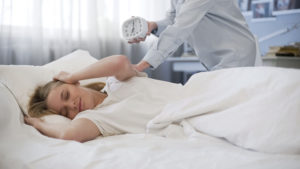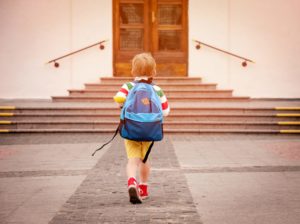How Much Sleep Do Student Athletes Need?
In addition to nutrition and physical exercise, sleep plays an essential role in helping athletes achieve optimal performance. Unfortunately, student athletes often juggle a variety of commitments that can make it difficult to meet sleep needs.
On average, college athletes spend between 27 and 41 hours per week on training and competition. Student athletes also face pressure to perform at high levels academically, and many student athletes hold part-time jobs or have other obligations. It comes as no surprise that at least 42% of student athletes regularly report getting poor sleep.
Our guidelines state that teens (ages 13-18 years) should be getting between 8 and 10 hours of sleep every night. School-age children (ages 6-12 years) need at least 9-12 hours.
Though napping can sometimes cause insomnia at night, it may be a good option for student athletes whose sleep schedules are hampered by training sessions and traveling. Taking naps earlier in the day can minimize the impact on nighttime sleep. One study on college athletes found that 72% of them napped on a regular basis.
Sleep needs vary according to the effort that has been exerted, meaning most athletes will need more sleep after an intense training session or competition. So far, researchers aren’t sure whether athletes from particular sports need more sleep than others. Given the many variables at play and the differences between sports, schedules, individual fitness levels, and other factors, much more research is needed before we can draw general conclusions.
Why Is Sleep Important For Student Athletes?
Sleep is essential for repairing wear-and-tear after exercise. Athletes tend to spend proportionally less time in rapid eye movement (REM) sleep and more time in slow wave sleep, the sleep stage where the body releases growth hormone and gets to work repairing muscles, building bones, and managing energy stores.
Sleep is also important for higher cognitive functions such as judgment, focus, and decision-making, which may make the difference between a game won or lost. It also plays a role in learning and memory, helping cement new skills during training.
A sleep extension study conducted on basketball players found that increasing sleep to 10 hours per night led to improvements in reaction time, sprint time, and shooting accuracy, as well as daytime sleepiness and overall mood. Researchers believe these effects were possible in part because they allowed athletes to catch up on their existing sleep debt. Short-term sleep extensions before important competitions might provide a timely boost in performance.
Looking to improve your sleep? Try upgrading your mattress.
What Are the Consequences of Sleep Deprivation for Student Athletes?
Student athletes who regularly sleep less than eight hours a night are 1.7 times more likely to sustain an injury. Studies on short-term and long-term sleep deprivation propose that sleep deprivation lowers endurance in runners, cyclists, and weight lifters. Sleep-deprived athletes subjectively tire faster and find it more of an effort to complete tasks.
Short-term sleep debt can also influence performance. One study on athletes found that their reaction times were fastest on Mondays and Tuesdays, after having had the weekend to catch up on sleep.
Sleep deprivation also has consequences outside of the athletic world. Compared to non-athletes, student athletes are more likely to drink and drive when sleep-deprived. Sleep loss also affects academic performance, the immune system, and can be a risk factor for suicidal ideation.

Factors That Influence Sleep in Student Athletes
Student athletes face an assortment of hurdles to getting quality sleep. These include sports-specific as well as academic and social factors:
- Irregular bedtimes: Setting a regular bedtime and wake-up time is one of the first things sleep doctors recommend for people with sleep problems. Unfortunately, intense training schedules with late-night or early-morning workouts, team meetings, irregular mealtimes, and jet lag from traveling across time zones can make this virtually impossible.
- Physical discomfort: Vigorous evening practices may cause a rise in core body temperature that interferes with the onset of sleep. Student athletes may also experience sore muscles, fatigue, or even pain that causes discomfort at night. Overhydration or dehydration before bed may also affect sleep quality.
- Pressure to perform: Students may suffer from insomnia related to stress and anxiety about upcoming competitions, or feelings of distress after not performing well. This relationship may be bidirectional, with insomnia consequently increasing feelings of stress and anxiety.
- Inadequate sleeping quarters: Dorms, hotel rooms, and other shared accommodation may have excessive levels of light and noise, which are not conducive to sound sleep. Some athletes may also find it difficult to drift off in unfamiliar environments, such as hotel rooms.
- Medical conditions: Anxiety, depression, eating disorders, premenstrual symptoms, and sleep disorders are not uncommon in young adults and exert additional barriers to quality sleep. Athletes who play rugby and other contact sports seem to be at a higher risk of developing sleep apnea.
- Screen time: More and more student athletes are using smartphones or other electronics in the evening. These devices release blue light that delays the onset of sleep.
- Concussions: Concussions sustained during training or matches can lead to ongoing sleep problems. In turn, sleep problems can complicate recovery from concussions. Sleep deprivation may also mimic concussion symptoms, making it difficult to establish a baseline and provide appropriate medical care.
Top College Dorm Room Essential
Tips for Improving Sleep in Student Athletes
Improving sleep for student athletes starts with implementing productive sleep hygiene habits. Many of these are feasible even for athletes who have little control over their schedules. Sleep hygiene tips include:
- Getting plenty of light during the day and avoiding screen time at night.
- Keeping the bedroom cool, dark, and quiet, or using adaptive strategies such as ear plugs and a sleep mask if this is not possible.
- Avoiding caffeine, nicotine, and alcohol, especially in the afternoon and evening.
- Avoiding large meals and excessive liquids before bedtime.
- Winding down in the evening with a quiet book or other soothing activity.
- Reserving the bed for sleep and sex only.
- Getting out of bed and going to another room to do something calming if you can’t sleep.
- Avoiding sleeping pills, as these can cause unwanted side effects.
- Using cognitive behavioral therapy for insomnia (CBT-I) or relaxation and mindfulness techniques.
Experts are increasingly advocating for better awareness and education on the importance of sleep for student athletes. Shifting training schedules to match student chronotypes, shifting the academic workload to the sport’s off-season, teaching sleep hygiene, and carrying out regular checks for sleep disorders are just some of the ways that schools could improve both athletic performance and quality of life for their student athletes.

Still have questions? Ask our community!
Join our Sleep Care Community — a trusted hub of sleep health professionals, product specialists, and people just like you. Whether you need expert sleep advice for your insomnia or you’re searching for the perfect mattress, we’ve got you covered. Get personalized guidance from the experts who know sleep best.
References
11 Sources
-
Kroshus, E., Wagner, J., Wyrick, D., Athey, A., Bell, L., Benjamin, H. J., Grandner, M. A., Kline, C. E., Mohler, J. M., Roxanne Prichard, J., Watson, N. F., & Hainline, B. (2019). Wake up call for collegiate athlete sleep: narrative review and consensus recommendations from the NCAA Interassociation Task Force on Sleep and Wellness. British journal of sports medicine, 53(12), 731–736.
https://bjsm.bmj.com/lookup/doi/10.1136/bjsports-2019-100590 -
Astridge, D., Sommerville, A., Verheul, M., & Turner, A. P. (2021). Training and academic demands are associated with sleep quality in high-performance dual career” student swimmers. European journal of sport science
https://www.tandfonline.com/doi/full/10.1080/17461391.2020.1857442 -
Stephenson, K. L., Trbovich, A. M., Vandermark, L. W., McDermott, B. P., Henry, L. C., Anderson, M. N., & Elbin, R. J. (2020). Exploring the effect of napping on sleep quality and duration in collegiate athletes. Journal of American college health : J of ACH, 1–6. Advance online publication.
https://www.tandfonline.com/doi/full/10.1080/07448481.2020.1803881 -
Sekiguchi, Y., Adams, W. M., Benjamin, C. L., Curtis, R. M., Giersch, G., & Casa, D. J. (2019). Relationships between resting heart rate, heart rate variability and sleep characteristics among female collegiate cross-country athletes. Journal of sleep research, 28(6), e12836.
https://onlinelibrary.wiley.com/doi/10.1111/jsr.12836 -
Milewski, M. D., Skaggs, D. L., Bishop, G. A., Pace, J. L., Ibrahim, D. A., Wren, T. A., & Barzdukas, A. (2014). Chronic lack of sleep is associated with increased sports injuries in adolescent athletes. Journal of pediatric orthopedics, 34(2), 129–133.
https://journals.lww.com/01241398-201403000-00001 -
Jones, B. J., Kaur, S., Miller, M., & Spencer, R. (2020). Mindfulness-Based Stress Reduction Benefits Psychological Well-Being, Sleep Quality, and Athletic Performance in Female Collegiate Rowers. Frontiers in psychology, 11, 572980.
https://pubmed.ncbi.nlm.nih.gov/33071908/ -
Suppiah, H. T., Low, C. Y., & Chia, M. (2016). Effects of Sport-Specific Training Intensity on Sleep Patterns and Psychomotor Performance in Adolescent Athletes. Pediatric exercise science, 28(4), 588–595.
https://journals.humankinetics.com/view/journals/pes/28/4/article-p588.xml -
Bastien, C. H., Ellis, J. G., Athey, A., Chakravorty, S., Robbins, R., Knowlden, A. P., Charest, J., & Grandner, M. A. (2019). Driving After Drinking Alcohol Associated with Insufficient Sleep and Insomnia among Student Athletes and Non-Athletes. Brain sciences, 9(2), 46
https://pubmed.ncbi.nlm.nih.gov/30791643/ -
Iso, Y., Kitai, H., Kyuno, E., Tsunoda, F., Nishinaka, N., Funato, M., Nishimura, E., Akihiro, S., Tanuma, H., Yonechi, T., Geshi, E., Sambe, T., & Suzuki, H. (2019). Prevalence and significance of sleep disordered breathing in adolescent athletes. ERJ open research, 5(1), 00029-2019.
https://pubmed.ncbi.nlm.nih.gov/30863771/ -
Blake, A. L., McVicar, C. L., Retino, M., Hall, E. E., & Ketcham, C. J. (2019). Concussion history influences sleep disturbances, symptoms, and quality of life in collegiate student-athletes. Sleep health, 5(1), 72–77.
https://linkinghub.elsevier.com/retrieve/pii/S2352721818302146 -
Hoffman, N. L., O’Connor, P. J., Schmidt, M. D., Lynall, R. C., & Schmidt, J. D. (2020). Relationships between post-concussion sleep and symptom recovery: A preliminary study. Journal of Neurotrauma, 37(8), 1029–1036.
https://pubmed.ncbi.nlm.nih.gov/31774024/







